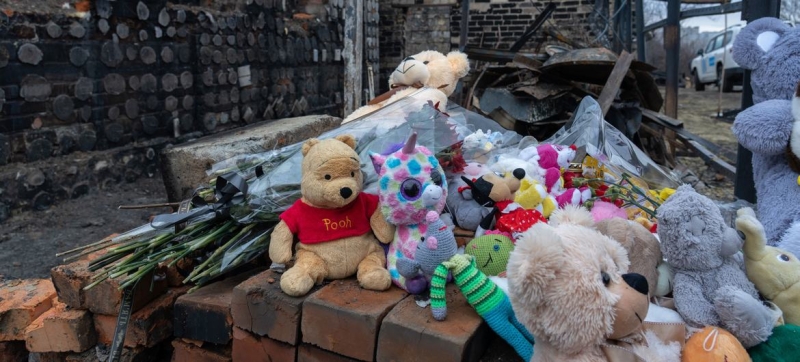
Destruction in Kharkov, Ukraine. (Archive) INTERVIEW | Attacks by drones and glide bombs are a daily reality for civilians in Ukraine Peace and security
Daily Russian attacks have damaged dozens of Ukrainian towns and villages in the country’s south, east and central regions, including the city of Dnieper, which came under fire again early Friday, UN aid agencies said. The Russian Armed Forces, in particular, use drones and glide bombs that can hit targets at a distance of up to 80 kilometers. According to the International Organization for Migration (IOM), this has reduced the ability of aid workers to reach people in need.
IOM also reports that 80 percent of the energy infrastructure in Ukraine’s second largest city, Kharkov, is currently damaged. Over the past week alone, 14,000 residents of the Kharkov region were forced to evacuate from front-line areas and border settlements. IOM coordinator Leila Saleiravesh, who is with her team in Dnieper, spoke in more detail about the situation in an interview with the UN News Service.
PM: Kharkov has been the center of events for some time now. Since January of this year, settlements in the front-line and border areas and the city of Kharkov have been subject to daily attacks by the armed forces of the Russian Federation.
The new wave of attacks damaged 30 towns and villages, prompting authorities to evacuate people or people to self-evacuate from these areas. The city of Volchansk is the central target of aggression. Of the 2,500 people, only 200 remained there. Authorities began mandatory evacuations of more than 30 villages and towns in high-risk areas, including for unattended children. According to the IOM, over the past week alone, more than 14,000 people were evacuated from border settlements and front-line areas.
Most of these people moved to Kharkov, where they stayed with friends and relatives or in collective centers. And in the city of Kharkov itself it is unsafe. Strikes occur daily. Just yesterday there were several attacks on residential areas in the city center.
UN News Service: What these attacks mean for civilians?
PM: This is everything from bombing to glide bombs, this is a new method that the Russian Federation is using, it is quite destructive. And with the help of glide bombs, Russian forces can reach targets 80 kilometers inside Ukraine’s borders. And they damaged a large number of infrastructure facilities. You may have heard that 80 percent of Kharkov’s energy infrastructure has been destroyed. In addition, there are daily drone attacks. Residents of Ukraine’s second largest city, with a population of 1.2 million, face these risks every day.
UN News Service: You talked about that only 200 people remained in Volchansk. Who are these people? Do you have access to them?
PM:These are mainly people who cannot leave: elderly people, people with disabilities, people who have nowhere to go. Many Ukrainians are also very attached to their land and home. That’s why many people don’t want to leave. But, as you know, Vovchansk was also occupied during a previous attack. And many people remained then. But this time, many more people are leaving the city.
UN News Service: Speaking of electricity and water supply, both of these are critical systems were attacked. You say that 80 percent of the civilian infrastructure was destroyed. What is the situation in the healthcare sector, in particular, can people with chronic diseases and those who have been injured receive medical care?
PM: The intensification of hostilities in the region and the displacement of the population have significantly overburdened the health care system in the city. Kharkov medical facilities and infrastructure are under attack from Russia. Personnel providing health care services face their own health and safety risks. The healthcare system is experiencing a shortage of qualified personnel. Kharkov authorities set priorities and tried to ensure the supply of electricity.
If access to electricity is limited, this will affect patients on ventilators and vaccines that require stable temperatures. Sterilizing medical instruments, maintaining hygienic conditions in medical institutions – all this requires electricity. Otherwise, infections will begin to spread. This puts patient safety at risk. Therefore, we are very concerned about how attacks on energy infrastructure and lack of electricity will affect the health system.
UN News Service: Dnepr this morning, where you are based, have been attacked. We admire your courage, your tenacity. What tasks are you facing today?
PM: At the moment, humanitarian organizations have developed many emergency plans, and we continue to work very closely with partners, with local authorities, to ensure that people in places like Kharkov, Sumy, and also in the front-line areas continue to receive support. The UN will remain here and continue to support the population. And our task, in essence, is to ensure that, in any circumstances, we can provide support to communities in need. That said, we remain very concerned about the health and safety of our colleagues in these areas. Many of them, along with their families, live with this nightmare every day, it is a serious burden on their mental health, on their safety, and it is very difficult to work in such circumstances.
Read also:
